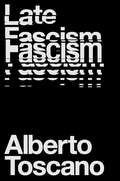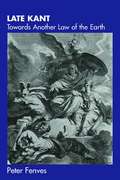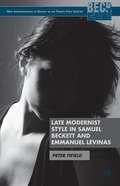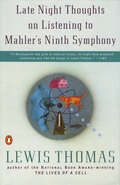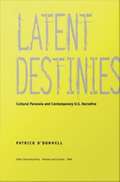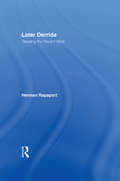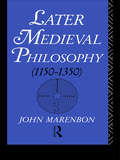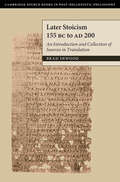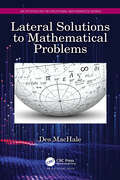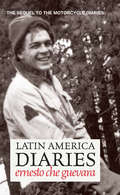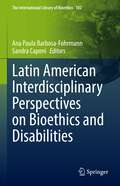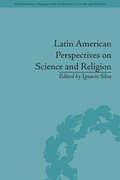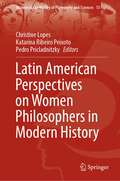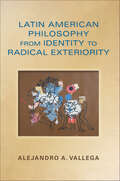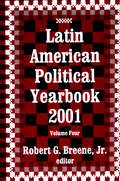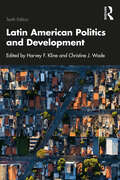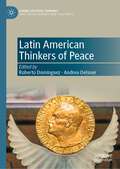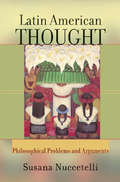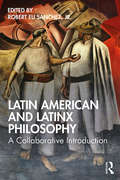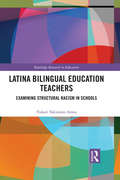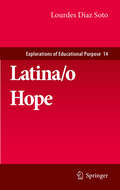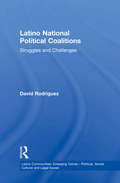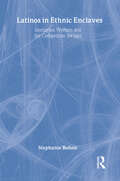- Table View
- List View
Late Fascism: Race, Capitalism and the Politics of Crisis
by Alberto ToscanoHow do we understand the return of fascism today?In a world shaken by ecological, economic and political crises, the forces of authoritarianism and reaction seem to have the upper hand. How should we name, map and respond to this state of affairs?Late Fascism turns to theories of fascism produced in the past century, testing their capacity to illuminate our moment and challenging many of the commonplaces that debate on this extremely charged term devolves into. It can be tempting for any contemporary assessment of fascism to reach for historical analogy. Fascism is defined by returns and repetitions, but it is not best approached in terms of steps and checklists dictated by a selective reading of Italian Fascism or National Socialism.Rather than treating fascism as an unrepeatable phenomenon or identifying it with a settled configuration of European parties, regimes, and ideologies, Toscano approaches fascism as a problem and a process, one that is intimately linked to capitalism's demands for domination. Drawing especially on Black radical and anti-colonial theories of racial fascism, Late Fascism makes clear the limits of identifying fascism simply with the political violence of bygone European regimes. Developing anti-fascist theory is a vital and urgent task. From the "Great Replacement" to campaigns against critical race theory and "gender ideology", today's global far-right is launching lethal panics about the threats to traditional political, sexual and racial regimes. Late Fascism allows us to rediscover some truly inspiring anti-fascist thinkers, rooted in their turn in largely anonymous collective practices of worldmaking against domination, traditions of the oppressed that remain a resource for those set on dismantling the hierarchies and segregations that the partisans of Order and Tradition seek to revive and reimpose.
Late Kant: Towards Another Law of the Earth
by Peter FenvesImmanuel Kant spent many of his younger years working on what are generally considered his masterpieces: the three Critiques. But his work did not stop there: in later life he began to reconsider subjects such as anthropology, and topics including colonialism, race and peace. In Late Kant, Peter Fenves becomes one of the first to thoroughly explore Kant's later writings and give them the detailed scholarly attention they deserve. In his opening chapters, Fenves examines in detail the various essays in which Kant invents, formulates and complicates the thesis of 'radical evil' - a thesis which serves as the point of departure for all his later writings. Late Kant then turns towards the counter-thesis of 'radical mean-ness', which states that human beings exist on earth for the sake of another species or race of human beings. The consequences of this startling thesis are that human beings cannot claim possession of the earth, but must rather prepare the earth for its rightful owners.Late Kant is the first book to develop the 'geo-ethics' of Kant's thought, and the idea that human beings must be prepared to concede their space for another kind of human. It is essential reading for anyone interested in the later works of Immanuel Kant.
Late Marx and the Russian Road: Marx and the Peripheries of Capitalism (Monthly Review Press Classic Titles #26)
by Teodor ShaninExplores Marx’s attitude to “developing” societies. Includes translations of Marx’s notes from the 1880s, among the most important finds of the last century.
Late Modernist Style in Samuel Beckett and Emmanuel Levinas
by Peter FifieldBeckett and Levinas are of central importance to critical debates about literary ethics. Rather than suggest the presence of literary and ethical value in the wake of the Second World War, this book argues that both thinkers waged a sustained attack on the principles of literature, weaving narrative and descriptive doubt through phenomenology, prose, and drama. Peter Fifield uses conceptual and rhetorical figures shared by Beckett and Levinas - such as the face, the trace, re-commencement, hyperbole, the saying and the said - to address a wide range of texts by both authors, arguing for a Levinasian manner of reading that is distinctly non-ethical.
Late Night Thoughts on Listening to Mahler's Ninth Symphony
by Lewis ThomasThis magnificent collection of essays by scientist and National Book Award-winning writer Lewis Thomas remains startlingly relevant for today’s world. Luminous, witty, and provocative, the essays address such topics as “The Attic of the Brain,” “Falsity and Failure,” “Altruism,” and the effects the federal government’s virtual abandonment of support for basic scientific research will have on medicine and science.Profoundly and powerfully, Thomas questions the folly of nuclear weaponry, showing that the brainpower and money spent on this endeavor are needed much more urgently for the basic science we have abandoned—and that even medicine’s most advanced procedures would be useless or insufficient in the face of the smallest nuclear detonation. And in the title essay, he addresses himself with terrifying poignancy to the question of what it is like to be young in the nuclear age. “If Wordsworth had gone to medical school, he might have produced something very like the essays of Lewis Thomas.”—TIME “No one better exemplifies what modern medicine can be than Lewis Thomas.”—The New York Times Book Review
Latent Destinies: Cultural Paranoia and Contemporary U.S. Narrative
by Patrick O'DonnellLatent Destinies examines the formation of postmodern sensibilities and their relationship to varieties of paranoia that have been seen as widespread in this century. Despite the fact that the Cold War has ended and the threat of nuclear annihilation has been dramatically lessened by most estimates, the paranoia that has characterized the period has not gone away. Indeed, it is as if--as O'Donnell suggests--this paranoia has been internalized, scattered, and reiterated at a multitude of sites: Oklahoma City, Waco, Ruby Ridge, Bosnia, the White House, the United Nations, and numerous other places. O'Donnell argues that paranoia on the broadly cultural level is essentially a narrative process in which history and postmodern identity are negotiated simultaneously. The result is an erasure of historical temporality--the past and future become the all-consuming, self-aware present. To explain and exemplify this, O'Donnell looks at such books and films as Libra, JFK, The Crying of Lot 49, The Truman Show, Reservoir Dogs, Empire of the Senseless, Oswald's Tale, The Executioner's Song, Underworld, The Killer Inside Me, and Groundhog Day. Organized around the topics of nationalism, gender, criminality, and construction of history, Latent Destinies establishes cultural paranoia as consonant with our contradictory need for multiplicity and certainty, for openness and secrecy, and for mobility and historical stability. Demonstrating how imaginative works of novels and films can be used to understand the postmodern historical condition, this book will interest students and scholars of American literature and cultural studies, postmodern theory, and film studies.
Later Derrida: Reading the Recent Work
by Herman Rapaport"First Published in 2002, Routledge is an imprint of Taylor & Francis, an informa company."
Later Medieval Philosophy: An Introduction
by John MarenbonFirst published in 1991. Routledge is an imprint of Taylor & Francis, an informa company.
Later Stoicism 155 BC to AD 200: An Introduction and Collection of Sources in Translation
by Brad InwoodMost modern readers of the Stoics think first of later authors such as Seneca, Epictetus and Marcus Aurelius. Existing works like Long and Sedley's The Hellenistic Philosophers concentrate on the Stoics of the early school. This book focusses on the more influential later school, including key figures like Panaetius and Posidonius, and provides well-chosen selections from the full range of Stoic thinkers. It emphasizes their important work in logic, physics and cosmology as well as in ethics. Fresh translations and incisive commentary present a picture of Stoic thought informed by up-to-date historical research and philosophical analysis. The book will be essential for scholars and students of ancient philosophy and of Hellenistic and Roman culture.
Lateral Solutions to Mathematical Problems (AK Peters/CRC Recreational Mathematics Series)
by Desmond MacHaleLateral Solutions to Mathematical Problems offers a fresh approach to mathematical problem solving via lateral thinking. Lateral thinking has long been used informally by good mathematics teachers and lecturers to spice up their material and interest their students in the more artistic aspects of mathematical problem solving. In this book, the author attempts to carry out this process formally, with reference to specific, non-technical problems that are easily understood and explained at an intermediate level.This book is appropriate for interested high school students, undergraduates and postgraduates, looking for relief from technical material and also looking for insight into the methodology of mathematics; for teachers and lecturers looking for a novel approach to course material; and anyone interested in both mathematics and lateral thinking.
Latin America Diaries
by Ernesto Che Guevara"A wonderful glimpse into the maturing mind of a great man and a vital companion to the previous Che diaries."-Michael McCaughan, The Irish Times"Guevara . . . chronicles labor uprisings and resistance against the influences and interests of the US and its intelligence operations. Guevara's passions for history, archaeology, and science are also apparent in this absorbing glimpse of the development of a legendary revolutionary figure."-Vanessa Bush, Booklist"This second volume of travel diaries by revolutionary icon Guevara (after Motorcycle Diaries) shows the 25-year-old rebel wandering around South America in the latter half of 1953."-Publishers WeeklyThis sequel to The Motorcycle Diaries includes letters, poetry, and journalism that document Ernesto Che Guevara's second Latin American journey following his graduation from medical school. After traveling through Bolivia, Peru, Ecuador, and Central America, Ernesto witnesses the 1954 US-inspired coup in Guatemala. He flees to Mexico where he encounters Fidel Castro, marking the beginning of a political partnership that profoundly changes the world and Che himself.This new, expanded edition has been fully revised especially for Ocean Press by Che's widow Aleida March, meticulously correcting her own work of checking Che's handwriting. Includes thirty-two pages of unpublished photos, including photos taken by Che's son Ernesto as he retraces his father's footsteps. Features a prologue by Alberto Granado, Che's traveling companion in The Motorcycle Diaries.
Latin American Interdisciplinary Perspectives on Bioethics and Disabilities (The International Library of Bioethics #102)
by Ana Paula Barbosa-Fohrmann Sandra CaponiThis book provides a critical analysis of the experiences of people with disabilities in Latin America. It covers a wide range of topics related to intellectual and psychosocial disabilities. Written by Latin American researchers and adopting an interdisciplinary perspective, it provides an original sociocultural contribution to bioethics and disability studies literature. It presents an in-depth overview of philosophical, ethical, legal, political and social issues. At the same time, it offers a contribution to the global scientific community inasmuch it discusses theoretical references from South America in connection with those from Europe and the United States. The basic questions dealt with range from criteria for human flourishing to questions of philosophy of mind, and neuroethics through phenomenological and aesthetic approaches to intellectual and psychosocial disabilities. The legal and political investigations explore the rights of those affected and the processes of their self-organization. The authors address the dynamics of medicalization and demedicalization, the practices of psychiatric institutionalization and the treatment of children with antipsychotics. This book appeals to psychologists, social scientists, bioethicists, healthcare personnel, philosophers, and lawyers working with cases related to people with disabilities.
Latin American Perspectives on Science and Religion ("International Perspectives on Science, Culture and Society" #1)
by Ignacio SilvaLatin America plays an increasingly important role in the development of modern Christianity yet it has been underrepresented in current scholarship on religion and science. In this first book on the subject, contributors explore the different ways that religion and science relate to each other.
Latin American Perspectives on Women Philosophers in Modern History (Women in the History of Philosophy and Sciences #13)
by Christine Lopes Katarina Ribeiro Peixoto Pedro PricladnitzkyThis book presents Latin American Perspectives on women philosophers, comprising selected articles from the First International Conference of Women in Modern Philosophy that took place in Rio de Janeiro City, Brazil, Latin America, in June of 2019. The conference brought together over twenty national, transnational, and international philosophers from seven countries, whose work combines historical and analytical insight to recover the philosophical legacy of women philosophers. Historical and analytical work on women’s philosophical thought constitute efforts to re-conceptualize what counts as philosophical knowledge and re-appraise the epistemic relevance of written material that women thinkers produced for most of history. This collection and the conference that gave origin to it are testimony to the enduring power of multinational and multicultural philosophical collaboration.
Latin American Philosophy from Identity to Radical Exteriority (World Philosophies)
by Alejandro A. VallegaWhile recognizing its origins and scope, Alejandro A. Vallega offers a new interpretation of Latin American philosophy by looking at its radical and transformative roots. Placing it in dialogue with Western philosophical traditions, Vallega examines developments in gender studies, race theory, postcolonial theory, and the legacy of cultural dependency in light of the Latin American experience. He explores Latin America's engagement with contemporary problems in Western philosophy and describes the transformative impact of this encounter on contemporary thought.
Latin American Political Yearbook: 2001
by Jr. DentonIn the fourth volume of this annual series, Robert G. Breene provides a comprehensive overview, analysis, and summary of the major political and economic trends and events in Central America, MERCOSUR, Andean and Caribbean nations, and Mexico. Analyzing these developments within the individual nations, their respective regions, and the world at large, the yearbook offers a timely look at the relevant background and information necessary to understand the changing nature of politics in Latin America today.The volume's opening two chapters continue the coverage of the earlier volumes, presenting details of various Latin American elections with relevant background information. The remaining five chapters cover various aspects of the development of regional history during the year 2001. Chapter 3 on U.S. diplomacy examines the immediate impact of President Clinton's various Latin American trips and initiatives. The Hemispheric Left and support for the Hemispheric Left are treated in general terms in chapter 4, while the next three chapters examine specific nations, Colombia (chapter 5), Venezuela (chapter 6), and Cuba (chapter 7) where these forces were of particular importance during the year.The material presented on Cuba is of particular interest considering the September 11, 2001 outrage; although, as the editor notes, it remains to be seen if the measures adopted at Guantanamo did keep Castro from dabbling in the aftermath. The final chapter continues the series' discussion of Latin American international organizations such as the Grupo de Rio and the Organization of American States. The continuity of the information presented in these volumes is one of their valuable assets as is the examination of the Disinformation Operation (DO) of the Hemispheric Left. Disinformation examples are many, ranging from the Harbury DO in Guatemala through Ruz Castro's Foro Soo Paolo and the totally misrepresented Zapatista National Liberation Army to the Great Gringo DO continues to operate with impunity.This is a reference volume with a point of view. It is brimming with facts and provides information not readily available through the American media. Compact, yet comprehensive, it is essential reading for political scientists, Latin American area specialists, and historians.
Latin American Politics and Development
by Kline and, Harvey F.For over forty years, Latin American Politics and Development has kept instructors and students abreast of current affairs and changes in Latin America. Now in its tenth edition, this authoritative yet accessible introduction has been updated throughout. Organized on a country-by-country basis, Latin American Politics and Development offers instructors maximum flexibility in organizing courses. Revisions to the Tenth Edition include: An updated theoretical framework to explain changes in the region, including discussions of electoral systems and political actors. Discussions on presidential, parliamentary, and municipal election cycles throughout the region from 2017 through early 2022. Coverage of the COVID-19 pandemic. Examination on the regional decline in democratic norms and practices. A look at the impact of the Trump administration on regional relations, including the decline in democracy. Updates on race, Indigenous groups, women, Afro-Latin Americans, contemporary social movements, religious and other non-elite groups.
Latin American Thinkers of Peace (Global Political Thinkers)
by Andrea Oelsner Roberto DomínguezThis book analyzes seven Latin American thinkers who have contributed to building bridges for reconciliation and peace: Carlos Saavedra Lamas, Adolfo Pérez Esquivel, Alfonso García Robles, Óscar Arias Sánchez, Rigoberta Menchú Tum, Juan Manuel Santos, and Javier Pérez de Cuéllar. Working within an eclectic conceptual approach to systematize the circulation of ideas embraced by each one of the thinkers, the various contributions delve into the current literature of leadership and intellectuals in Politics and Global International Relations (GIR). Overall, the central premises of the analysis are based on three fundamentals of mainstream constructivism: a) change across time and space in the lifetime of each thinker under analysis in this book; b) socialization through changing norms, rules, and language; and c) processes of interaction in which actors make choices in selecting networks and strategies). Coming from different walks of life, the seven thinkers examined in this book have accessed the global public square and discussed ideas to reduce conflicts at different scales. In their respective historical times, they circulated their views and ideas beyond the confines of Latin America to influence global political thought and produce change in favor of peace.
Latin American Thought
by Susanna NuccetelliMany of the philosophical questions raised in Latin America may seem to be among the perennial problems that have concerned philosophers at different times and in different places throughout the Western tradition, but they are not altogether the same--for Latin American thinkers have often adapted them to capture problems presented by new circumstances, and sought resolutions with arguments that are indeed novel. This book explains how well-established philosophical traditions gave rise in the New World to a characteristic form of thought not to be found in other cultures. There was no clean sweep of the past and an attempt to start over: rather, Latin American thinkers gradually adapted European ideas to their needs, sometimes borrowing on a larger scale, sometimes less. It is then no surprise that, under Iberian rule, Scholasticism became the accepted view and began to lose its grip only when the rulers did. But what does seem surprising is the radical way in which those traditions were on occasions challenged, as illustrated by the cases of José de Acosta, a Jesuit priest in Peru, and the Mexican nun, Juana Inés de la Cruz-each of whom spoke out against certain aspects of the official philosophy in colonial society. And when theories familiar elsewhere arrived to Latin America, as in the cases of positivism and Marxism, they were often seen differently in the light of new circumstances.But above all, this book shows that there is a body of interesting philosophical arguments offered by Latin Americans concerning problems that have arisen in Spanish- and Portuguese-speaking parts of the New World. In connection with this purpose, it examines how Latin Americans have thought about philosophical issues belonging to metaphysics, philosophy of science, cross-cultural psychology, feminist epistemology, ethics, and social and political philosophy. These are taken up in due course, paying special attention to questions of rationality, gender discrimination, justice, human rights, reparation for historically dispossessed native peoples, and relativism vs. universalism--all matters of continuing concern in Latin American thought, from its earliest stirrings to the present day. And among some specific issues that have generated heated controversies from the early twentieth century to the present, the book explores how Latin Americans and their descendants abroad think of their own cultural identity, examines their critique of US mass-culture and moral philosophy, and considers at some length the vexing problem of which name, if any, is the correct one to use to refer to all of this exceedingly diverse ethnic group. A closer look at the defining elements of Latin American identity has often led to questions concerning the characteristic features that might distinguish Latin Americans and their descendants abroad from other peoples of the world, the existence of a typically Latin American philosophy, and the correct name to refer to them. These, often conflated in the literature, are treated separately by the author, who favors a historically-based account of Latin-American identity. She also argues that the existence of a characteristically Latin American philosophy can be shown-though not by appealing to some standard but implausible reasons. And to resolve the question concerning a correct ethnic-group name, she proposes a new approach to the semantics of those names.
Latin American Thought: Philosophical Problems and Arguments
by Susana NuccetelliMany of the philosophical questions raised in Latin America may seem to be among the perennial problems that have concerned philosophers at different times and in different places throughout the Western tradition, but they are not altogether the same--for Latin American thinkers have often adapted them to capture problems presented by new circumstances, and sought resolutions with arguments that are indeed novel. This book explains how well-established philosophical traditions gave rise in the New World to a characteristic form of thought not to be found in other cultures. There was no clean sweep of the past and an attempt to start over: rather, Latin American thinkers gradually adapted European ideas to their needs, sometimes borrowing on a larger scale, sometimes less. It is then no surprise that, under Iberian rule, Scholasticism became the accepted view and began to lose its grip only when the rulers did. But what does seem surprising is the radical way in which those traditions were on occasions challenged, as illustrated by the cases of José de Acosta, a Jesuit priest in Peru, and the Mexican nun, Juana Inés de la Cruz-each of whom spoke out against certain aspects of the official philosophy in colonial society. And when theories familiar elsewhere arrived to Latin America, as in the cases of positivism and Marxism, they were often seen differently in the light of new circumstances. But above all, this book shows that there is a body of interesting philosophical arguments offered by Latin Americans concerning problems that have arisen in Spanish- and Portuguese-speaking parts of the New World. In connection with this purpose, it examines how Latin Americans have thought about philosophical issues belonging to metaphysics, philosophy of science, cross-cultural psychology, feminist epistemology, ethics, and social and political philosophy. These are taken up in due course, paying special attention to questions of rationality, gender discrimination, justice, human rights, reparation for historically dispossessed native peoples, and relativism vs. universalism--all matters of continuing concern in Latin American thought, from its earliest stirrings to the present day. And among some specific issues that have generated heated controversies from the early twentieth century to the present, the book explores how Latin Americans and their descendants abroad think of their own cultural identity, examines their critique of US mass-culture and moral philosophy, and considers at some length the vexing problem of which name, if any, is the correct one to use to refer to all of this exceedingly diverse ethnic group. A closer look at the defining elements of Latin American identity has often led to questions concerning the characteristic features that might distinguish Latin Americans and their descendants abroad from other peoples of the world, the existence of a typically Latin American philosophy, and the correct name to refer to them. These, often conflated in the literature, are treated separately by the author, who favors a historically-based account of Latin-American identity. She also argues that the existence of a characteristically Latin American philosophy can be shown-though not by appealing to some standard but implausible reasons. And to resolve the question concerning a correct ethnic-group name, she proposes a new approach to the semantics of those names.
Latin American and Latinx Philosophy: A Collaborative Introduction
by Robert Eli Sanchez Jr.Latin American and Latinx Philosophy: A Collaborative Introduction is a beginner’s guide to canonical texts in Latin American and Latinx philosophy, providing the non-specialist with necessary historical and philosophical context, and demonstrating their contemporary relevance. It is written in jargon-free prose for students and professors who are interested in the subject, but who don’t know where to begin. Each of the twelve chapters, written by a leading scholar in the field, examines influential texts that are readily available in English and introduces the reader to a period, topic, movement, or school that taken together provide a broad overview of the history, nature, scope, and value of Latin American and Latinx philosophy. Although this volume is primarily intended for the reader without a background in the Latin American and Latinx tradition, specialists will also benefit from its many novelties, including an introduction to Aztec ethics; a critique of “the Latino threat” narrative; the legacy of Latin American philosophy in the Chicano movement; an overview of Mexican existentialism, Liberation philosophy, and Latin American and Latinx feminisms; a philosophical critique of indigenism; a study of Latinx contributions to the philosophy of immigration; and an examination of the intersection of race and gender in Latinx identity.
Latina Bilingual Education Teachers: Examining Structural Racism in Schools (Routledge Research in Education #22)
by Yukari Takimoto AmosUsing critical race theory and whiteness studies as theoretical frameworks, this book traces two Latina bilingual education teachers in three different professional phases: as paraprofessionals, teacher candidates, and certified teachers. Grounded in a longitudinal case study, this book sheds light on the effects of institutional racism when Latina/o educational professionals attempt inclusion in white dominant organizations, such as schools. Revealing and analyzing the structural racism present in schools and the obstacles it creates for professionals of color, the author exposes the racist practices that are hidden from view and offer practical solutions to combat them.
Latina/o Hope
by Lourdes Diaz SotoThere are an estimated forty-eight million Latinas/os living in the United States, roughly sixteen percent of the population. Not only are they the largest minority group in the country but also the youngest: one out of five children is Latina/o. The rise in the Latina/o population has caused for panic in some areas of the country, resulting in hostile and sometimes violent racism and xenophobia, and yet, much of that hatred is fueled not on facts but rather on myths about immigration. To date, most studies on immigration have been data driven, focusing on migrating groups or policy analyses. Latina/o Hope is different. It incorporates salient theories on migration as it moves toward a new theorizing, one that views immigration from the immigrant's perspective. Thus, it integrates research into the depiction of various slices of immigrant experience--the young women disappearing in the city of Juarez, the various students at various stages of their educational journeys, the young children in need of ESL programs, the ethnically-mixed immigrants, the undocumented workers, and others. Latina/o Hope discusses the impact of neoliberal policies and global capitalization on the daily lives of Latina/o immigrants, serving as an inspiration for dialogue, praxis and imagination to love and serve one another.
Latino National Political Coalitions: Struggles and Challenges (Latino Communities: Emerging Voices - Political, Social, Cultural and Legal Issues)
by David RodriguezThis study examines Latino national political coalitions in the United States with a focus on Chicanos, Puerto Ricans, and Cubans. It argues that Latino national political coalitions are an avenue of political empowerment for the Latino Community, but face social, economic, and political challenges in the Latino community.
Latinos in Ethnic Enclaves: Immigrant Workers and the Competition for Jobs (Latino Communities: Emerging Voices - Political, Social, Cultural and Legal Issues)
by Stephanie BohonThis work explores the competition for jobs between different Latin American immigrant groups in the U.S. economy. Bohon's research looks at occupational status attainment among Latino groups in Miami and three other U.S. cities with flourishing Latino enclaves.
